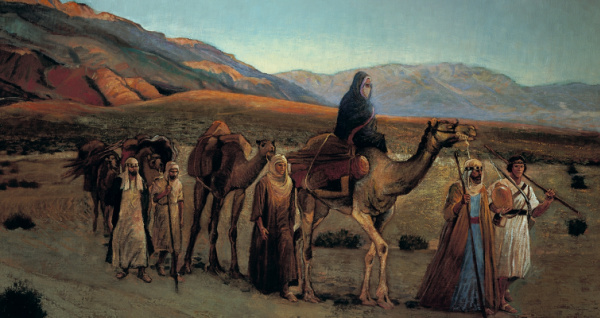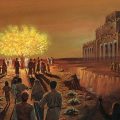Question
Gramps,
Why didn’t Laman and Lemuel and whomever else wanting to return to Jerusalem, just go back and leave Nephi and his family?
David
Answer
David,
The story of Laman and Lemuel, sons of Lehi, is often viewed through the lens of rebellion and discontent within the sacred narrative of The Church of Jesus Christ of Latter-day Saints. Their repeated desires to return to Jerusalem, despite the journey they undertook with their father and brother Nephi, raise compelling questions about their motivations and decisions.
Laman and Lemuel’s journey into the wilderness was fraught with challenges, yet their desire to return to Jerusalem was equally pronounced. Why did they not simply return to the familiar city, especially when they expressed dissatisfaction with their wilderness experience? Understanding their mindset requires a deep dive into their fears, cultural context, and spiritual struggles.
One of the most significant factors influencing Laman and Lemuel’s decision was their fear of potential consequences. After leaving Jerusalem, Lehi warned his family about the dangers of returning (1 Nephi 7:15). The brothers were acutely aware that abandoning their father and the rest of their family could lead to dire repercussions, including being ostracized from their family and tribe (1 Nephi 2:21). In the cultural context of their time, familial and tribal identity was paramount; thus, the fear of being cut off from their community weighed heavily on their minds. This fear likely kept them tethered to their family, despite their grievances.
The notion of consequence is further illustrated in the narratives of the Israelites, who, despite their complaints in the wilderness, ultimately feared the repercussions of returning to bondage in Egypt (Numbers 14:2-4). Laman and Lemuel’s situation mirrors this sentiment, highlighting a common human tendency to cling to the known, even if it is fraught with hardship.
While fear played a crucial role, Laman and Lemuel were also driven by greed and the hope of attaining a promised land. Their father Lehi spoke of a land filled with milk and honey, a place of abundance and divine favor. This vision created a powerful incentive for them to endure the difficulties of the wilderness. Although they often murmured about their suffering and questioned their father’s leadership, they still held onto the hope of receiving the promised blessings (1 Nephi 17:21).
This hope for a better future acted as a counterbalance to their grievances. The allure of the promised land kept Laman and Lemuel from returning to the comforts of Jerusalem, as they believed that enduring their current trials would ultimately lead to greater rewards. Their situation illustrates a profound truth: hope can be a powerful motivator, propelling individuals to persevere through challenges in pursuit of a brighter future.
A recurring theme in Laman and Lemuel’s story is their tendency to murmur and express dissatisfaction. They exhibited a continual lack of faith in the divine guidance that their father claimed to receive (1 Nephi 2:12). Their failure to recognize and appreciate the miracles surrounding them—such as the guidance from God and the preservation of their lives—further contributed to their spiritual struggles.
This lack of faith manifested in their complaints about the hardships they faced. Instead of finding strength in their father’s revelations and the divine assistance promised to them, they chose to dwell on the negative aspects of their journey. This spiritual downfall made it increasingly difficult for them to consider returning to Jerusalem, as their hearts were hardened against the very blessings they sought.
In the ancient Near Eastern context, family loyalty was a critical social construct. For Laman and Lemuel, the idea of severing ties with their father, Lehi, and their brother, Nephi, was daunting. Even though they were rebellious, their kinship and cultural expectations likely influenced their decision to remain with their family, despite their dissatisfaction.
To abandon their family would not only mean losing their identity but also risking their social standing within a society that heavily valued familial bonds. Thus, even in their rebellion, the thought of completely breaking away from their family ties served as a powerful deterrent against returning to Jerusalem.
The dynamics of Laman and Lemuel’s relationships were further complicated by their marriages into Ishmael’s family. By marrying Ishmael’s daughters, they formed new familial ties that created a sense of belonging and loyalty to that family. This connection may have provided sufficient motivation for them to remain in the wilderness, as they were now intertwined with another family’s fate (1 Nephi 16:7). Their relationships with Ishmael’s family may have fostered a sense of community, making the thought of returning to Jerusalem less appealing.
The reluctance of Laman and Lemuel to return to Jerusalem stems from a complex interplay of fear, hope, cultural expectations, and personal struggles. Their story serves as a cautionary tale about the dangers of murmuring and the importance of faith in divine guidance. As members of The Church of Jesus Christ of Latter-day Saints reflect on Laman and Lemuel’s narrative, it is vital to remember the lessons it imparts about obedience, faith, and the blessings that come from enduring trials in pursuit of a promised future.
In our own lives, we may find parallels to Laman and Lemuel’s experiences—moments when we feel lost in the wilderness of our own challenges. However, we can choose to hold onto hope, recognize the miracles around us, and remain faithful to our divine purpose.
Gramps








